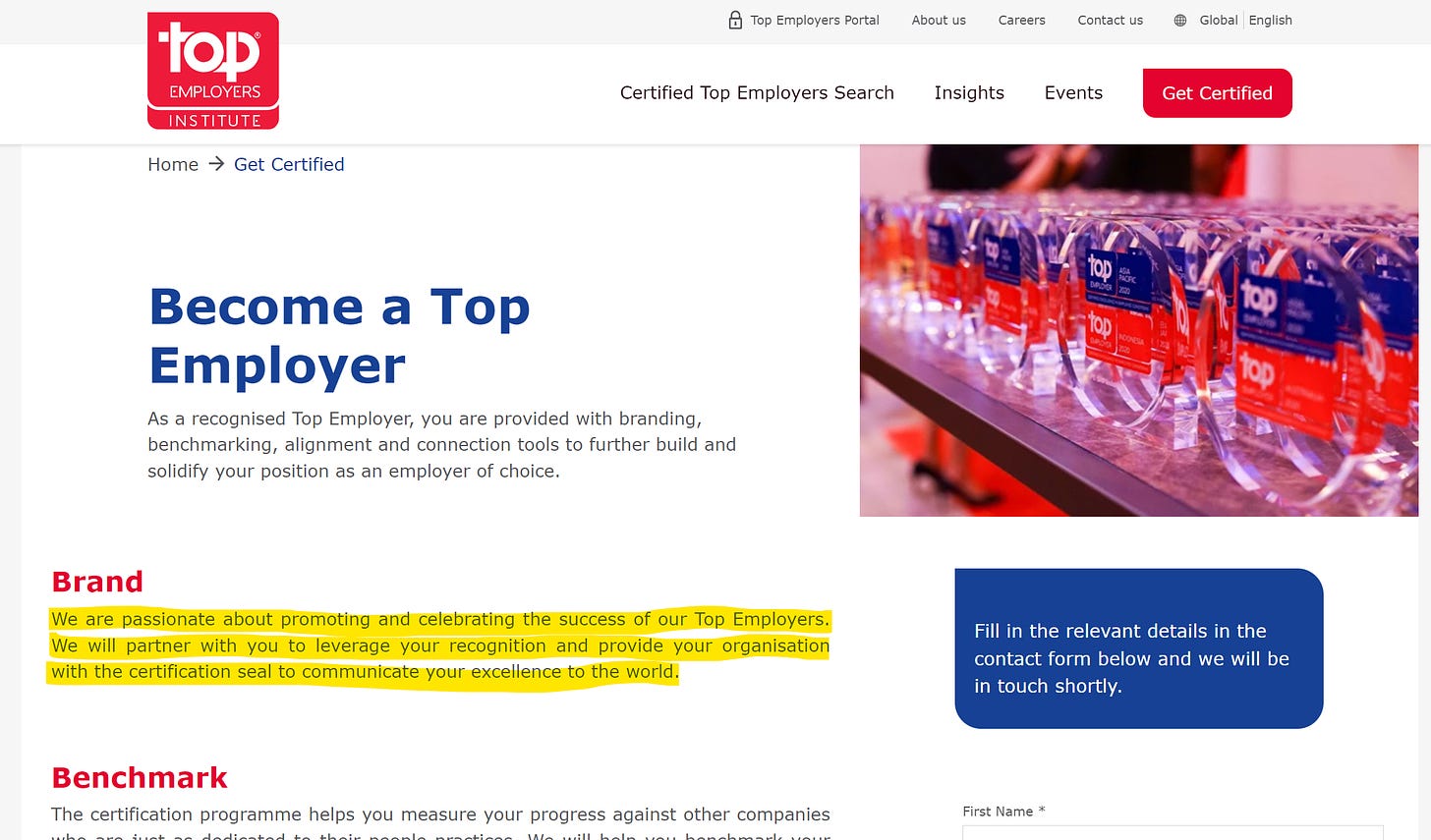Amazon UK, my former employer, has been named a “Top Employer” by the Top Employer Institute, which certifies companies based on a range of people management criteria.
On its official website, Amazon celebrates thusly:
Amazon has been named as a Top Employer 2024 in the UK by the Top Employer Institute, one of the world’s most prestigious certifications in the field of human resources management. It recognises our commitment to the development and well-being of our employees.
I take nothing away from Amazon for capitalizing on a great PR opportunity by touting this certification.
Indeed, “branding” is the first thing the institute emphasizes in making its case to employers for why they should get certified. This is mentioned even before the certification criteria or process.
Surfing the institute’s website, I couldn’t actually find a detailed explanation of how they conduct “Top Employer” certifications. But I was able to find a report about how getting certified boosted perceptions of employers. Almost as if perception and branding are the main point of this whole thing.
When something like this gets rolled out, I think a lot of people read a headline like “Top Employer” and make a lot of assumptions about what that means. It sounds like a label for a great place to work.
But labels can be confusing sometimes.
So let’s try and be clear what this particular “Top Employer” label means.
It means someone from Amazon reached out to the Top Employer Institute and initiated the certification process. The Institute conducted an audit of Amazon’s HR processes and decided to certify Amazon as a Top Employer based on that audit.
That’s it. All it means is Amazon stood a process audit.
Like I mentioned above, the Institute doesn’t spell out how it certifies businesses. Nor what if any fee it charges, though we can presume reasonably there is one.
We also can’t tell whether it’s possible to fail the audit, or what percentage of candidate businesses have fallen short. Does everyone pass?
The Institute assesses a range of HR processes such as Workforce Planning, Performance Management, and Onboarding.
But interestingly, it doesn’t assess a bunch of other stuff that we might assume would be covered.
Like actual employee sentiment. I don’t see any evidence employees are interviewed or their input considered in whether their employer is certified. That seems weird.
Safety is also not mentioned. This should be the #1 criteria for any employer. How physically safe people are and how psychologically safe they feel arguably form the most crucial criteria in gauging the quality of an employer. If people aren’t or don’t feel safe but the award is still given, you don’t have much of an award. You’ve got a nice paperweight.
Turnover and retention are also not mentioned, which is odd. If a company has a great performance management process, but it’s being misapplied in ways that cause regretted attrition, what good is grading the input?
There’s a lot missing, actually.
Whether a business is hiring and firing simultaneously.
Number of redundancies.
Absence levels.
Illness levels.
Stress levels, which should be measured as part of sentiment.
Union membership levels.
Strike activity.
Living wage, living hours, and living pension accreditation.
Flexible working tolerance.
Employee-to-manager ratios.
All of this should be part of determining “Top Employer” status, because people seeing that label affixed will assume so.
Does a process-focused certification mean anything? Does it adequately include the voice of the employee? Because the people of Amazon UK seem conspicuously absent from this PR moment and the certification driving it.
Make no mistake, Amazon does have some world class HR processes, and some fantastic people who drive and improve and protect them. I saw some examples of superb people leadership when I worked there.
But it wasn’t all sunshine and rainbows. There are areas for improvement. My observation about company culture was that its values were heralded when things were going well for shareholders, but easily swept aside when financial pressure came on, or even threatened to do so.
There are senior Amazonians who think it’s “naive” to pay frontline workers a market-leading wage, even though the company celebrates being a market leader.
There are senior Amazonians who shut down discussion on key topics to avoid debate or make autocratic decisions without hearing relevant voices. The CEO’s heavy-handedness in coercing corporate employees back into the office was not an isolated cultural incident.
This isn’t top employer stuff. My fear is that by stamping itself with new credibility, the company might feel emboldened to continue accepting decay in its value system and culture.
I saw this sort of false comfort and internal propaganda with the US Air Force 10-15 years ago and it led to a broken service as riddled with risk and dysfunction as the post-Vietnam Army. If Amazon takes such a path, it won’t end well. Unless getting more searches than Blockbuster on Memebase is a good outcome.
Did Amazon share the Institute’s audit results with its employees so they could see the good, bad, and ugly?
This is best practice; it invites those most impacted by HR processes to help improve them, which creates an internal mechanism to keep getting better.
I would be interested to see a more fulsome announcement. One that shows what got assessed, what didn’t, and how the company is applying what it learned.
Absent that level of transparency, this feels like a PR move.
A shrewd one, yes.
But the ultimate PR move would be for Amazon to celebrate being considered a great employer because its own employees said so. Hire an independent auditor to look under the bonnet and provide honest feedback on the full range of “top employer” criteria rather than pre-scripted auditing in a selective framework.
That would be a hell of a lot more convincing than getting certified by professional certifiers based on evidence of process rather than voices of people.
It’s fair to ask whether this particular “Top Employer” does what it says on the tin, and whose opinions are being considered in concluding whether that is so.
This is on my radar today, and now it’s on yours.
TC is a former L8 leader in Amazon’s operations network and an independent voice on leadership, management, and organizational culture.







